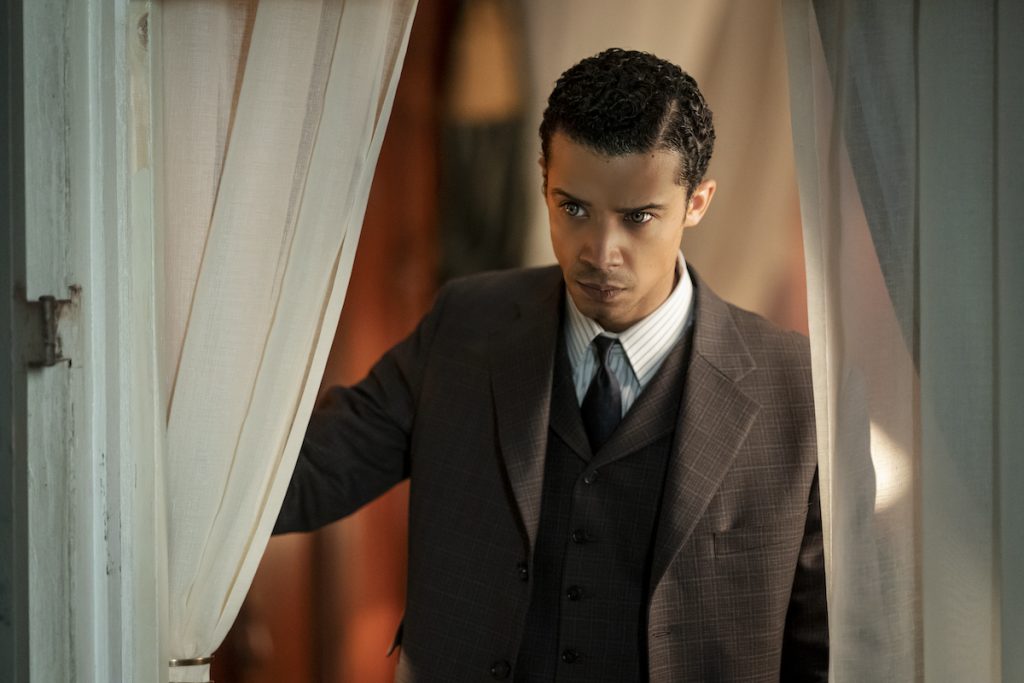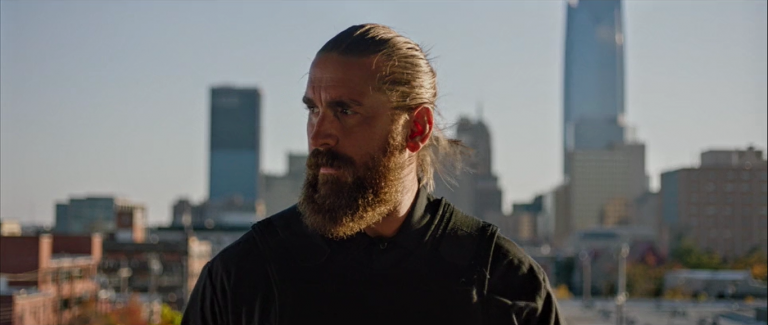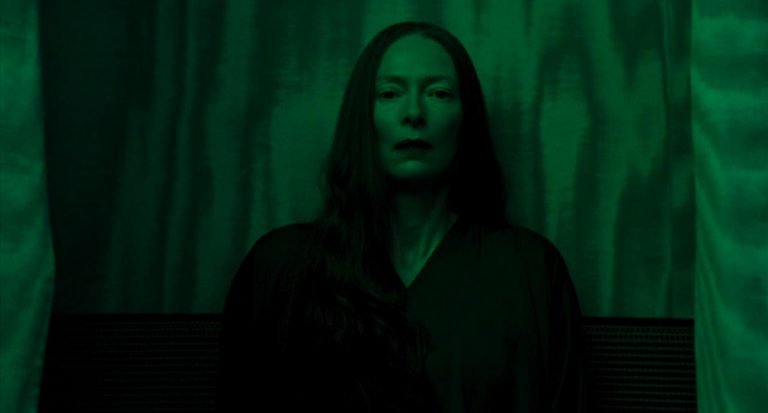Interview with the Vampire (Season 1), Episode 3 Recap & Ending Explained: Interview with the Vampire has just come out with its latest episode. The idea to adapt the book into a series is turning out to be effective. Even better is to reinvent the book with modern sensibilities. If episode 2 saw Louis and Lestat engage in a passionate love affair and the former beginning to question vampire traditions, episode 3 changed the tone completely. It presents a conflict and tension that might even fracture the relationship. An old friend from Louis’ previous life is what it took for Lestat to admit he isn’t as blasé as he makes people think he is. Questions of identity and social structure run ragged in the latest episode.
Read our recap and ending explainer of the brilliant episode 3 of Interview with the Vampire. The show has a classic period look and reminds one of Hannibal, with all the meat-eating going around. It surely tantalizes you as a fan of the film and the idea of what it actually represented that you can now watch it on AMC+.
Interview With the Vampire (Season 1), Episode 3 “is My Very Nature That of a Devil” Recap:
Our two gentle “not” men sit in the park and read the paper. Just like normal human beings would. Lestat, the romantic and connoisseur between the two, mentions how the park they sit in is described in the column he reads. He describes in beautiful words the rich history of the place that is found in history books. Louis adds the part that often misses out – people of color killed and their heads piked on iron gates as signs of warning to other posers. Louis’ idea of adding reason to a primal thing such as hunting, which is primarily instinctive, bemuses Lestat.

He has carried on his pleading to Lestat from the previous episode, where the killing of the soprano made him angry with himself. The two men wander around town, continuing their enlightened debate about how to satiate their thirst for blood. They discuss the morality of choosing their prey more selectively instead of “randomly killing them.” Louis feels that using their brain reading powers can facilitate the weeding of the filth out. But Lestat’s maturity and elevated status show when he says, “every one of them is capable of abomination; even the ones worthy of our admiration.” Humans, by default, are faulty. Depravity can present itself in endless forms.
Lestat gives Louis what he wants and kills a delinquent in an alley. Louis purposely snaps a black cat from the pavement to demonstrate his point and eats it instead. This is more than just defiance. It is Louis’ way of self-introspection, questioning the vampire race as a whole. He feels guilty to be among one of them, and the way we see him in the present surely validates that notion. Lestat is too smart and insightful not to pick up on that. They sit in the Azalea, where the businessman boasts how people in Atlanta are talking about the place. Lestat is unsettled when Louis proclaims he isn’t killing people anymore. The vampire confronts the pianist to vent his frustrations, just like he did with the soprano. Or maybe it stems from his love for music and melodies. Who knows?
The crowd lulls Lestat into taking the piano, and he obliges, against Louis’ wishes. The real reason why he insulted the pianist throws us even closer to worshipping Lestat. He did not confront him out of anger; well, maybe a tad. But he did so because the pianist was about to leave the club for a band in Chicago. The tune Lestat improved got everyone in the groove, inducing the pianist, and was later known as “Wolverine Blues.” Daniel is taken aback when he learns one of his favorite classics was indeed penned by a vampire. He confirms the account with Louis but also plays several recordings of him talking about Lestat. But almost every time, his view and opinion about him are different. The interviewer then defines their relationship as an “abused-abuser psychological relationship.” Louis is clearly delusional, according to Daniel, who is concerned by his varying accounts of Lestat. Maybe he is letting on a bit less than he is.
This isn’t the fantastical gothic romance that Louis dreamed their relationship up to be. He was a victim through and through. Louis reads a passage out of Daniel’s book and defines the tapes as “admitted performances.” It is the premise of their interview. Daniel must allow Louis to live through his own odyssey to further that purpose. Daniel obliges and throws away the physical form of the tapes and deletes the digital footprint. The account now begins afresh on a clean slate. Louis says this portrait of Lestat is the more nuanced, truthful account of their time together and the man (read “vampire”) he was. Lestat teasingly jokes around with Brown when she mentions their homosexual relationship. It is quite a tense moment as Lestat is firmly in control, which can never be good.
When Louis returns from eating another rodent, he expects the burning body to be that of Brown. But Lestat says he didn’t kill her as she has talents. He is playing with Louis’ mind by insinuating the relationship is an open one. Soon enough, as the war struck and racism reached its high in America, the city passed an ordinance that banned the colored prostitutes from carrying on in his club. They had to move across the street. Some of these legislators were Louis’ clients. To circumvent it, he made the black girls owners of the business and filed a writ against the ordinance. That business proved to be more profitable for them. The politicians seemed more interested in war and having their weight behind the military camps outside the city. And they warn Luis that there will be another ordinance.
Jonah Macon, an old Louis friend, pays him a visit. He is enlisted in the army and has returned after a long time out of town. They make plans to meet later as well, as Louis gets nostalgic remembering the old times when life was simple. They go out for a walk, where it is insinuated that the two are old lovers. Louis says their relationship is open and proceeds to get physical with Jonah. When he returns to Lestat, the two make up strangely. They plan to go to dinner after Lestat says he is ending it with Brown. In the present, Louis says “that the mud of Lestat’s boot should have come from anywhere.” But he is confused about the details when Daniel tries to break the scene down.
Louis’ visit to his house doesn’t go as planned. His mother is afraid he has “turned into the devil,” only coming at night when people are asleep. Grace’s husband resists him from entering the house and meeting Grace and the twins. In a moment of anger, he kicks down the doors, but they go flying out, putting both Grace and the twins standing in the hallway and his mother in shock. The latter is more concerned with proving that her son is indeed who she says he is, and Louis leaves in shame after Grace asks him to go. When he returns to Lestat’s place, he has an even bigger surprise waiting for him.
Lestat has offered to host the soldiers in his house as the Azalea is temporarily shut down. He gives Louis the notice that the men who cut the electricity showed him. When Louis asks Lestat to send them away again, he uses his exceptional cerebral ability to order them out. They move like they are under his spell and leave quietly, with everything as it is. He then professes his anger when he says, “I am a lot,” something that Louis told about him to Jonah. “You were there,” says Louis, pointing the finger at Lestat. He further provokes Lestat by saying he is getting jealous. And then, by lying, it was just something physical and didn’t mean anything. Lestat angrily bursts out, saying that their hearts were dancing. They were indeed enjoying it with intense passion.
Interview With the Vampire (Season 1), Episode 3 Ending, Explained:
He says how Louis lives his life is no way to go about it. Louis bemoans the loss of his “real family” and everything he cared about. He and Lestat go to Fenwick’s office to protest the shutting down of the Azalea.
The councilman gives a lame explanation to cover up the clearly racist move. He then reads Fenwick’s mind, which confirms the theory. Tom and Fenwick fooled Louis, as they must have many colored businessmen before him, knowing that a situation like this would arrive someday. Louis confesses to Daniel that when his mother said he came from the Devil, it got him thinking about his nature. He explains his anger at Fenwick cheating and how he threw him down the hole. “Take a black man in America, make him a vampire, f*ck with him, and see what comes of it.” That is exactly what Fenwick will discover in the next few moments. The councilman still tries to put up a show that his actions aren’t about race. Storyville will see many more casualties, and Louis isn’t the first. But the vampire knows better.
The brutal killing, and Fenwick being impaled on the iron gates of the townhouse, incite riots in the city. They burn the Azalea, and the violence spreads. Lestat mocks his actions and tries to show Louis his real face. He did what he did because it gave him pleasure. Louis embracing his darker side excites Lestat. But Louis leaves him, saying he is condemned to be alone all his life. Louis makes his way to the worst affected area of the city, the Quarter. There, he realizes the grave insensitivity and pain of his actions. He has let chaos out of the box on these unwitting and unwilling participants. When he sees a rooming house burn and a girl trapped inside, he rushes towards her. She will be his redemption, he says—his Claudia.
So, we have finally reached the point where we will see Claudia in action. She is perhaps one of Louis’ closest confidantes and his ever-shining hope in the books. Although Lestat will probably not be deserted yet, there is certainly a distance between the two now. Louis killing the councilman can be looked at from different perspectives. While Lestat believes it to be Louis’ natural disposition, he says it was fueled by something more moral inside him. The urge to get justice, maybe. It is an important moment in the scheme of the story and Louis’ narration of his time. It will definitively change the way he looks at everything that happened to him. And so will Daniel.




![Only Lovers Left Alive [2013]: A Haunting & Hypnotic Mood Piece](https://79468c92.delivery.rocketcdn.me/wp-content/uploads/2017/09/only-lovers-left-alive-2-768x393.jpg)

![The Last Kingdom: Seven Kings Must Die [2023] ‘Netflix’ Movie Ending Explained: What Happens to Uhtred?](https://79468c92.delivery.rocketcdn.me/wp-content/uploads/2023/04/The-last-kingdom-Seven-Kings-Must-Die-e1680639634248-768x512.webp)
![Secret Obsession Netflix [2019] Review: A Thrilling Drama That Barely Holds Together](https://79468c92.delivery.rocketcdn.me/wp-content/uploads/2019/07/Secret-Obsession-Netflix-1-768x432.jpg)